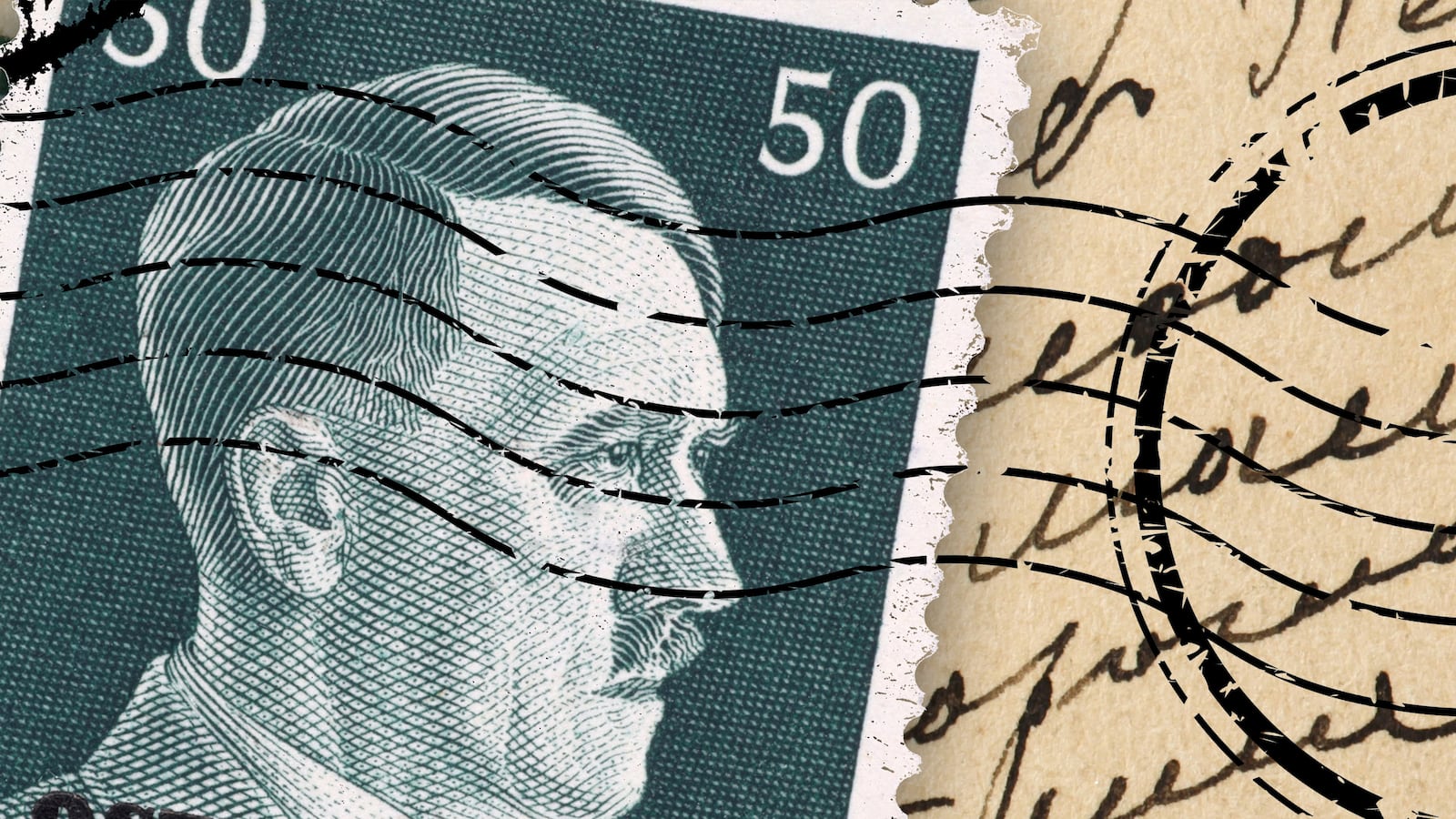In mid-1945, just months after Adolf Hitler committed suicide in his bunker, rumors emerged that the German dictator had survived with his mistress, Eva Braun, escaped the country, and was hunkered down somewhere. Where exactly was unclear. People spotted him at neo-Nazi gatherings in Colombia, on a U-boat in Argentina, or with a barely-legal girlfriend in Brazil. Some American papers cited rumors that he had taken to digging tunnels in the mountains of southeastern Kentucky. The evidence of survival was weak to non-existent. But by 1947, a Gallup poll found 45 percent of Americans believed Hitler had survived—among them, a group of disgruntled German descendants scattered across the country who, for several months, had been corresponding with a man who called himself “Furrier No. 1.”
In hundreds of letters mailed between 1946 and 1956, “Furrier No. 1” explained that he was, despite misspelling his title and writing in vernacular English, Adolf Hitler. As it turned out, both he and Braun had survived! They had set up camp in Kentucky to plot a “new revolt” and take over the United States, then the world, and finally: outer space. Hitler and his gang of 36,000 German dissidents were hard at work digging tunnels from the nearby mountains to Washington, D.C., to aid their revolution. When he wasn’t underground, Hitler got around by way of “invisible cab.” Together, his “huge armies of soldiers and scientists” had built 116 secret factories across Kentucky and Idaho to develop atomic bombs and “invisible spaceships which made no sound.”
Everything was going according to plan, “Furrier No. 1” explained, but he needed help: specifically, in the form of a generous contribution to the cause. By 1956, the faux-Führer collected at least $11,000 from recipients of his letters, though authorities estimated the real figure lay closer to $15,000 (over $140,000 when adjusted for inflation). In exchange for financial support, he offered prominent positions in the new regime—the coveted ranks of “Furrier No. 2” and “Furrier No. 3”—to top donors. Smaller contributors would be thanked with “royal palaces” and “diplomat virgins.”
But on Aug. 11, 1956, “Furrier No. 1” was arrested and charged with three federal counts of using the mail to defraud. The Furrier was not, as he claimed, Adolf Hitler, but a 61-year-old African-American coal miner and part-time Baptist preacher named William Henry Johnson. Johnson, described as a “tall, full-face man with a strong, convincing voice” by a court witness, had been duping would-be interstellar neo-Nazi conquerors for a decade.
In the half-century since the scandal, very little has been published about Will Johnson. His grift made a quick cameo in Jay Robert Nash’s Almanac of World Crime (1981), which caught the eye of Kentucky writer Keven McQueen, who mentioned it in his book, More Offbeat Kentuckians (2004). Johnson appears in a short entry on the Notable African American Kentuckians Database, an aside in a 1976 issue of Cincinnati Magazine, a post on a Canadian psychiatrist’s personal blog, and a recent tweet from cartoonist C. Spike Trotman. Most records of the heist share a scarcity of detail. “It’s amazing how little there is out there about him,” McQueen told The Daily Beast, of researching Johnson back in 2003. “I wrote letters to the Kentucky State Police Archives and the F.B.I., and they didn’t have any record of whether Johnson was convicted, or even went to trial.”
But Johnson did go to trial and he was convicted, according to archival issues of The Middleboro Daily News, The Cincinnati Enquirer, The Louisville Courier-Journal, and seven other local papers recently reviewed by The Daily Beast. After his arrest in August of 1956, reported in the August 13 issue of The Middleboro Daily News, he was detained on a $2,500 bond in the county jail in Pineville, Kentucky. The brief article, titled “MAN DISCLAIMS HE IS HITLER,” said Johnson had pleaded guilty, but denied orchestrating the scheme for personal benefit. Instead, he claimed to be a private detective, working to “track down a ring of subversives seeking to set up a new government here.”
Three months later, Johnson appeared before a federal grand jury, which indicted him on three counts of mail fraud. At the hearing, reported in The Middleboro Daily News on November 15, 1956, Johnson elaborated upon his defense. He held up a “a shiny, new detective badge,” the paper wrote, and told the court he had been “trying to break this case” so he could turn it over to the FBI. “It started about 10 years ago when a man named ‘Hoover’ came to my home and told me about Hitler,” Johnson said, possibly referring to the then-active (and arguably dictatorial) FBI Director J. Edgar Hoover. “He said he was Furrier No. 2 and wanted me to help collect funds.”
The full story wouldn’t emerge until the following April, when Johnson’s case was laid out over a two-day trial. Postal inspector William Lewis told the court that he had first heard of the scam at least a year prior (variously reported as late 1953 or December of 1955), after the death of G. A. Huber, a 70-year-old stonemason in Bristol, Virginia, a small border city that extends across state lines into Bristol, Tennessee. When Huber’s relatives began to sift through the “penniless” mason’s belongings, they had found money orders totaling at least $4,000 and “nearly 200 of Johnson’s letters in his shack.” The notes promised the German descendant the position of “Furrier No. 2,” occasionally spelled “No. 2 Fuehrer,” and commander of the Nazi armies in Hitler’s coming “new kingdom,” which would span the globe and outer space.
Johnson had met Huber years prior, while the stonemason was looking into reports that Hitler and Eva Braun were hiding in Kentucky. The Reverend promised Huber, a former Army sergeant in World War II, to act as a “go-between” between Huber and Hitler. Huber, whom Asst. U. S. District Attorney John M. Kelly later described as having “poor physical and mental health” and “disgruntled” views about the government, sent “Furrier No. 1” $10,000 over the course of several years.
After the Hubers’ tip, Inspector Lewis began sending Johnson several “decoy” letters, along with small contributions, ranging from $5 to $15, to see if he would bite. When Johnson collected a $15 money order from a Middlesboro Western Union in August of 1956, Lewis authorized his arrest.
Over the decade before his arrest, Johnson received over 100 money orders, averaging, according to one witness “about $15 to $20” each, mostly sent from Bristol and Johnson City, Tennessee. But authorities admitted at court that they could not say for sure just how many letters he had sent or how many people had been duped.
Officers did identify at least one other target of Johnson’s scam: an African-American handyman named, incredibly, Charlie Brown, who had donated roughly $1,000 to the cause, despite having little money himself. When Inspector Lewis interviewed him, Brown had just mailed “Hitler” $20, leaving him with only eight cents in his pocket and a single can of beans for food. Brown had considered it an investment. Johnson had promised him the title of Furrier No. 3, the position of governor over a large territory, a “royal palace,” and some virgins. “Also, give him his choice among diplomat virgins,” one letter read, “that he might take a wife of our peoples to hand down German rulers to rule their race.
“God give me to you all for to bring the superior race in to lead the world [sic],” Johnson wrote to Huber in one letter. “You is the next in line of great leaders to lead Germany and rule the world, in which I am proud to to say, also I am going to make our colored friend Brown assistant world ruler for his bravery act of last week (in sending money).”
Many of Johnson’s letters were signed by other aliases, including “Eva Hitler,” “Eva Braun,” “Admiral Kesselring, Chief of Staff” (Kesselring was in fact a Generalfeldmarschall), sometimes just “Kesselring” or “Chief of Staff,” and occasionally, his own name, Rev. William H. Johnson. A few messages came from a “Hitler aid” named “A. von Boguslowski.” Postal inspectors wondered whether Johnson added “bogus” as a private joke.
As any number of these characters, Johnson might make requests. “In addition to money,” the so-called Eva Braun wrote, “send a sport coat and a pair of white shoes, size 11. It is necessary for Adolf to dress sporty so he won’t be recognized.”
A few times, Brown or Huber wanted to meet Hitler. But Johnson quickly persuaded them against it by concocting urgent crises—FBI traps, elaborate escapes, or invented illnesses. “We are going everything to keep the blood streams around the brains clear,” Johnson wrote in one letter under the alias General Kannengiesser, “to keep down a paralyze which is possible when brain stream are not clear, and free—of course, if such would develop we would be force to call you in. But unless that happen, it ain’t necessary to call you in. You means more to us at present working outside [sic].”
At trial, one of the key pieces of evidence against Johnson was his penmanship. Handwriting expert James Dibowski, who became the director of the Postal Inspector’s Identification Lab in Cincinnati, testified that “Hitler’s” signature on the letters in fact belonged to Johnson. The post office was familiar with Johnson. In 1951, five years into his scheme, and five years before it would end, Johnson had landed himself with probation for a different mail fraud conviction. The reverend had posed as an attorney, Dibowski told the court, and taught a recently remarried widow how to forge records and reinstate her unmarried widow checks, in exchange for a cut of the profits.

Adolf Hitler and his stupid mustache
AFP via GettyThe other smoking gun was Johnson’s handwritten confession. “I am guilty of everythings,” he wrote after his arrest. “That is pertain to G. A. Huber and Adolph Hitler, I am guilty of it all, and Charley Brown and W. A. Roger of Cincinnati Ohio [Inspector Lewis] and begs the mercies of the Hon. Judge and Court. And if you can forgive me and allow me another chance of freedom, I will prove my worthy and make a good citizen. If not, please be merciful unto me, a poor guilty criminal [sic].”
But Brown had confessed on the condition that the inspectors would prohibit newspaper coverage. After hearing they could not, he added, “TThen I’ll have to pelad not guilty to protect my reputation with my church congregation [sic].”
At trial, Johnson told the jury that he had graduated from a “Chicago Secret Service correspondence school,” showing an even larger badge that read “Secret Service.” He claimed that he had been commissioned by an unnamed Chicago firm to write the letters, and “only pretended to go along with scheme” in order to find out if Hitler actually was alive. According to one report, he alleged that “two ‘other men’ had dictated the letters to him and that he had turned over all money to them,” but didn’t supply their names or addresses. In another, he is cited saying that the two men were G.A. Huber’s cousins, Olson and Carlson Huber.
In the end, Brown was still pleased enough with Johnson to testify on his behalf, showing receipts proving he had given back $800 of the $1,000 donation. But it was not enough to convince the jury. After a 15-minute deliberation, they found him guilty on all three mail fraud charges. The presiding judge, H. Church Ford, sentenced him to three years in federal prison for each count, to be served concurrently. After the trial ended, Johnson would not appear in any local papers again. His birth certificate, death certificate, marriage certificate, or obituary have not been found.



